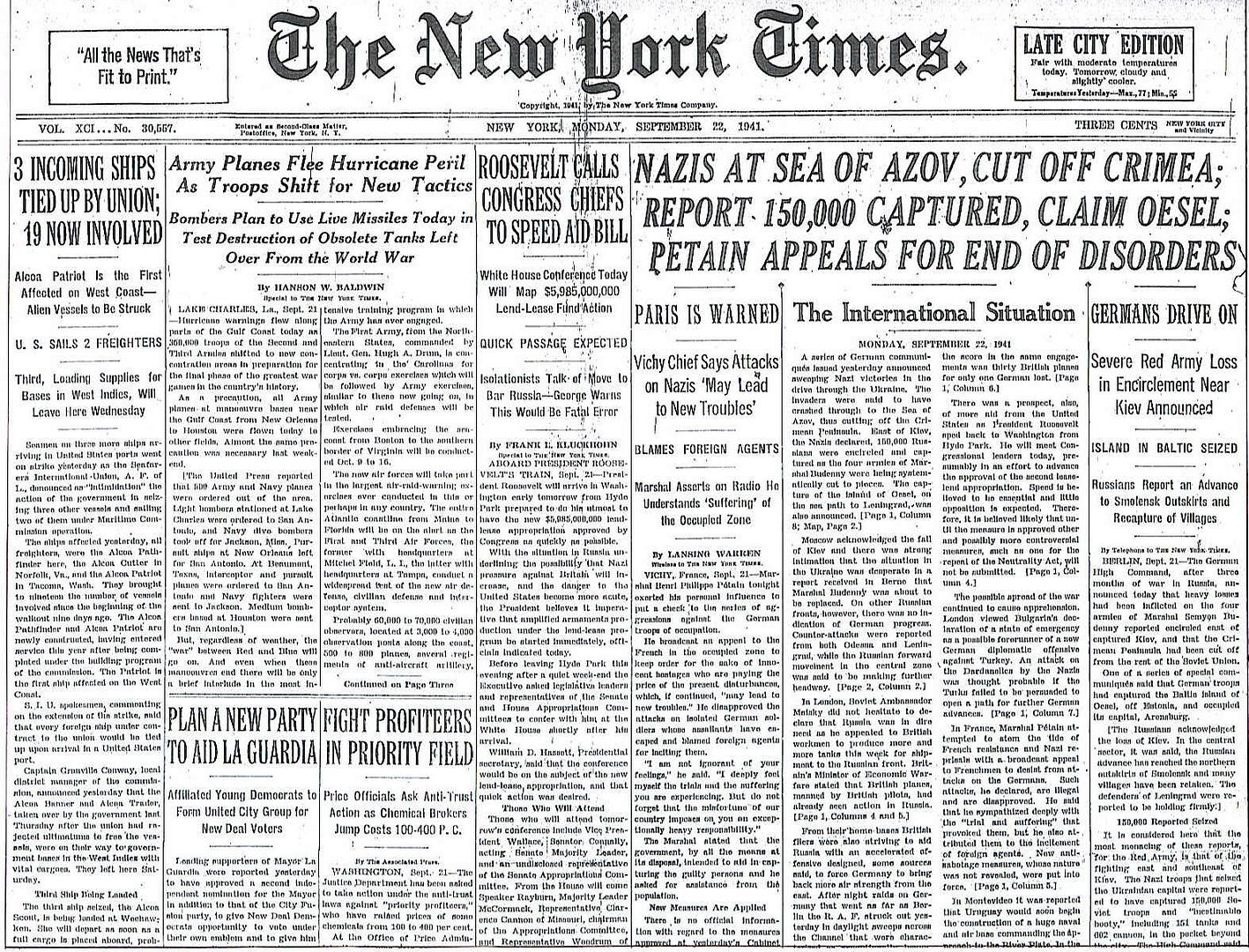
Posted on 09/22/2011 4:51:57 AM PDT by Homer_J_Simpson

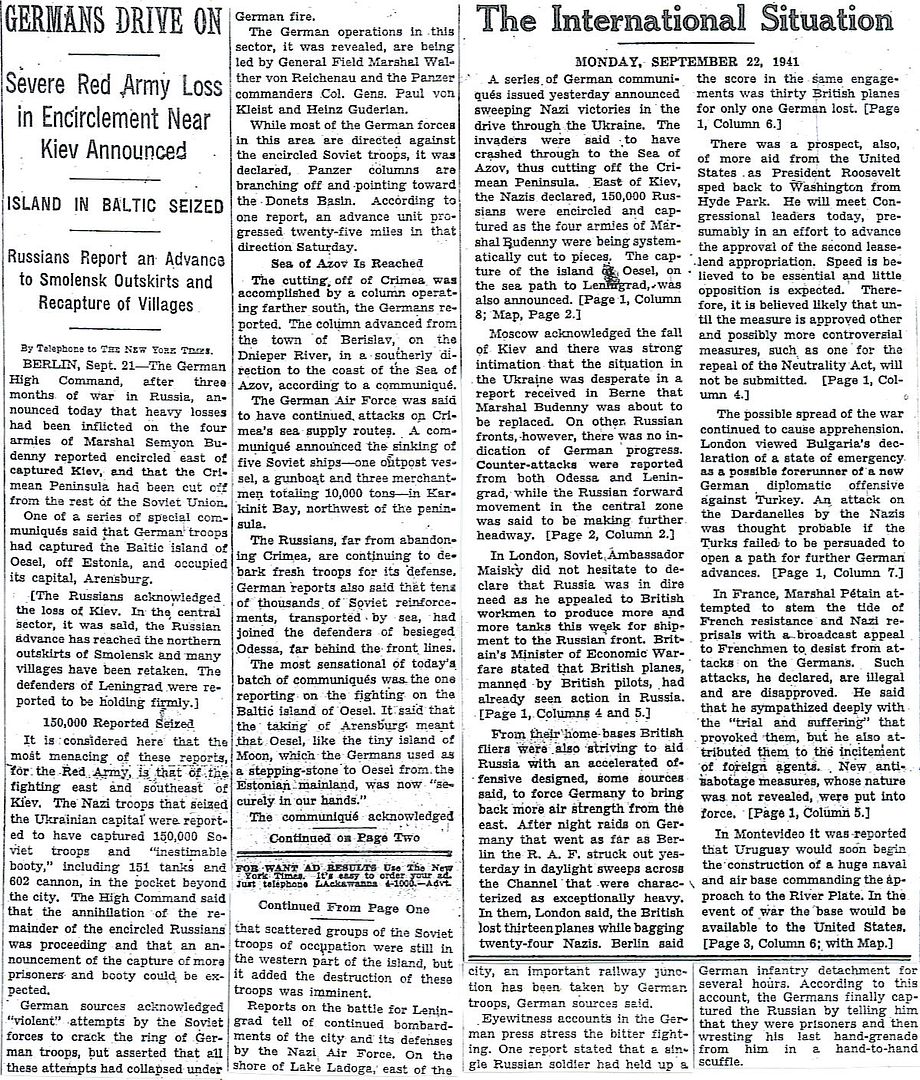
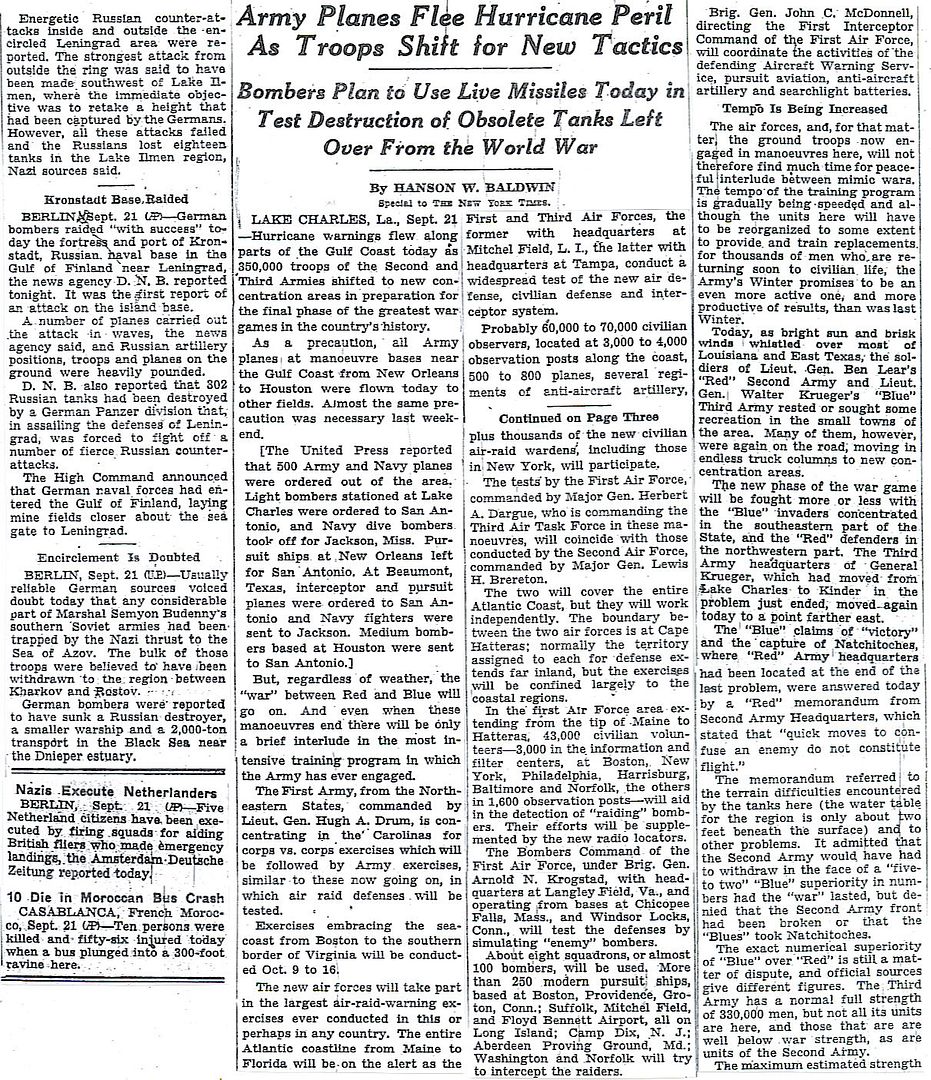
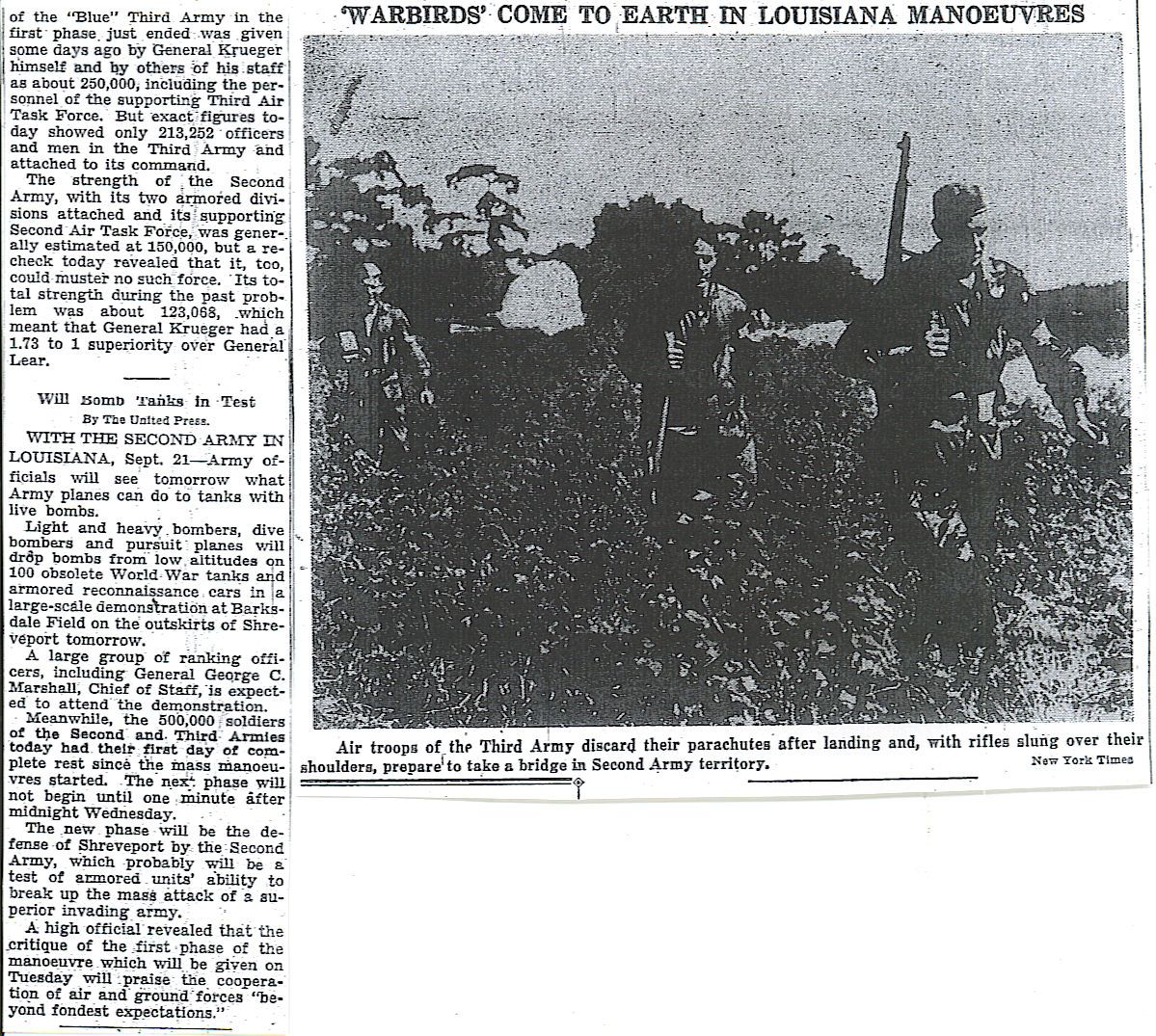
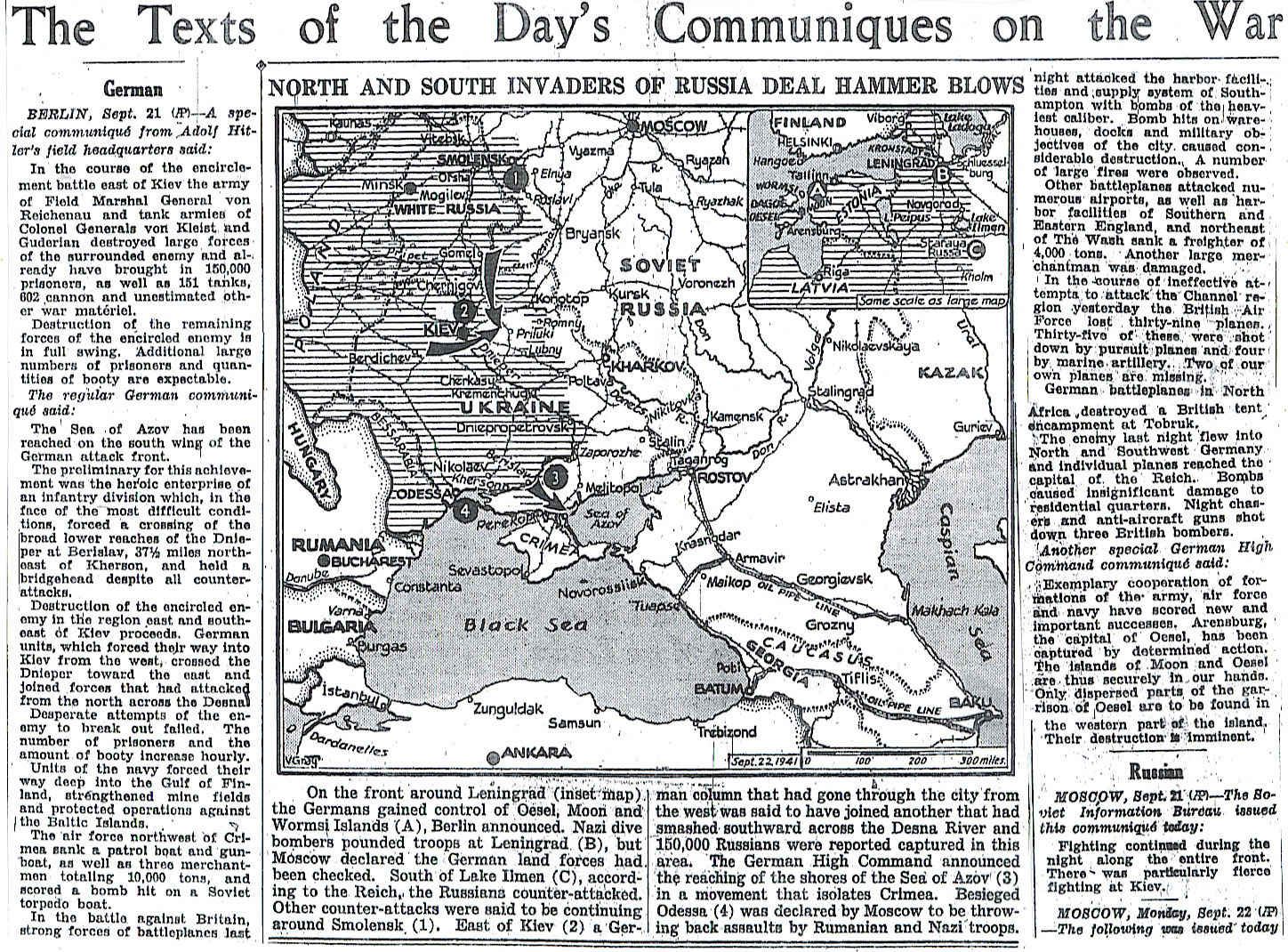
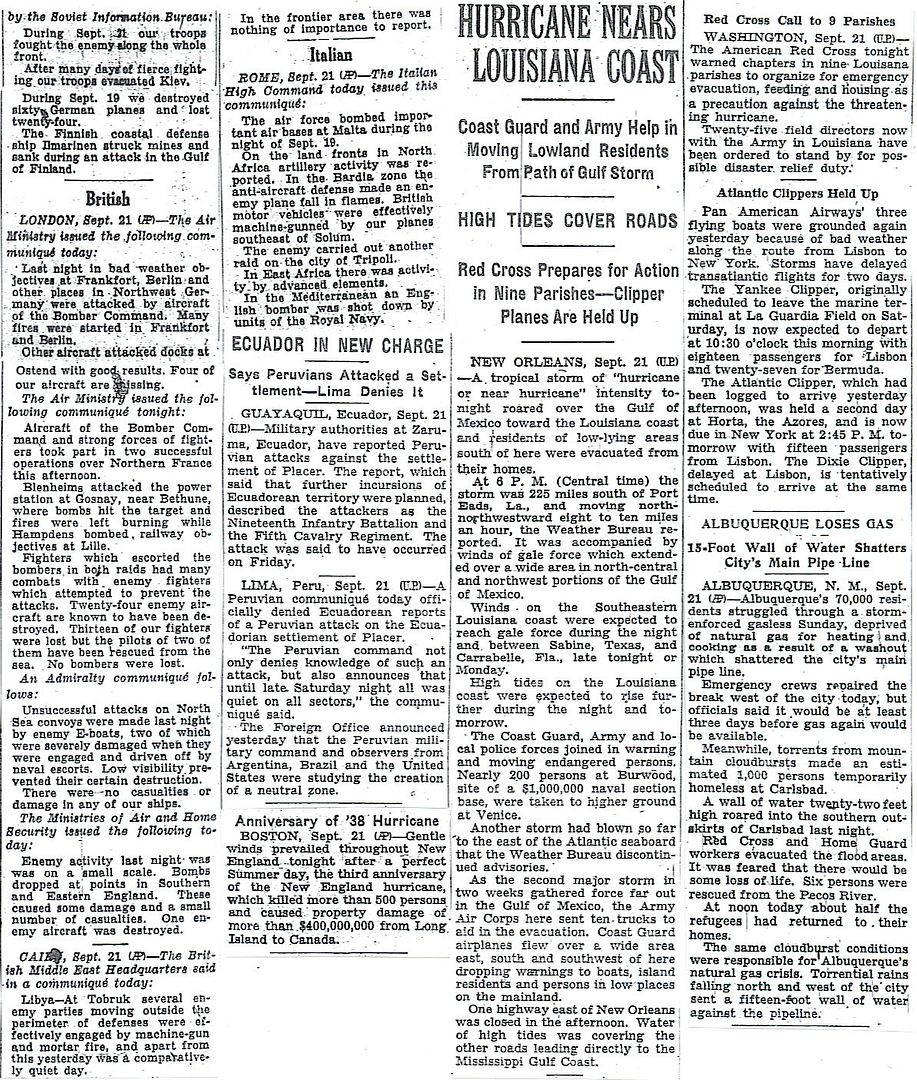
http://www.onwar.com/chrono/1941/sep41/f22sep41.htm
Exiled Greek King in London
Monday, September 22, 1941 www.onwar.com
In Britain... King George of Greece arrives in London.
Churchill always obsessed with military details, far more knowledgeable than Roosevelt or Truman, or Hitler or Stalin.
http://homepage.ntlworld.com/andrew.etherington/month/thismonth/22.htm
September 22nd, 1941
COMMONWEALTH OF THE PHILIPPINES: MacArthur and Hart meet. MacArthur informs Hart he will ignore any plans which do not call for the full defence of the Philippines.
Stark informs Hart that he will receive 12 new Fleet submarines, an additional submarine tender, and 6 PT boats and outlines Army reinforcements being sent by the War Department.
U.S.A.: The United States removes the embargo on export of arms to Cuba.
UNITED KINGDOM: King George of the Hellenes and the Greek government arrive in London from Egypt.
GERMANY: The government tells Bulgaria to enter war or be occupied.
U.S.S.R.: Vinnitsa: A squad of SS-trained Ukrainian militia kills 28,000 Jews.
FINLAND: Norwegian Ambassador J. W. Michelet presents the Finnish Foreign Minister Rolf Witting a British note, stating that if Finland doesn’t withdraw its forces behind the pre-1939 borders, His Majesty’s Government is forced to consider Finland an enemy. Even if Finns comply, diplomatic relations won’t be restored and blockade lifted as long as there are German troops in Finnish territory. (Mikko Härmeinen)
ATLANTIC OCEAN: U-103 sinks SS Edward Blyden and SS Niceto de Larrinaga in Convoy SL-87. (Dave Shirlaw)
There were others besides Guderian who were waiting with heightening anxiety for the Führer's arrival at Novy Borisov.
Already during that first victorious and intoxicating summer of 1941 the headquarters of Army Group Centre had become " the immediate centre of active operational conspiracy-a nest of intrigue and treason."
Superimposed on the strictly professional heart-searching and disputation which were part of the centre-thrust controversy and which affected every member of the staff, there was an intense—even grotesque—activity by a group of officers with political and constitutional objectives.
Bock's G.S.O. I, Major General Henning von Tresckow, and his A.D.C., Fabian von Schlabrendorff, had conceived the idea of literally taking Hitler for a ride.
Once inside the net of Army Group Centre's security system, the Führer's car was to be diverted and the occupants detained. Hitler would be subjected to an extempore trial, and an order of deposition, or even of execution (although the concept had not yet been mentioned specifically), would be pronounced. How matters were to develop thereafter is not clear. Nor, indeed, is it likely that the conspirators had planned any further than the removal of the Fuhrer's persona and the relief, thereby, of the obligations inherent in the loyalty oath.
Certainly this particular attempt, and its successors which emanated from that same headquarters, enjoyed none of the carefully planned supporting processes which were triggered off by the attentat of 20th July, 1944.
It may well be asked how the idea, much less the execution, of a Putsch could enjoy serious consideration at such a time, when German arms seemed everywhere to be invincible. The answer, surely, is that the plotters were the personification of all that was best of their country's qualities, a rational intellectualism allied to a selfless bravery. Their intention was for the creation of a " decent Germany," that national entity whose elusive quality has for so long been the despair of European politicians, and being Germans, they naturally held military strength and constitutional order to be corollaries of " decency."
At the front, five hundred miles inside Russia, they were in a better position to appreciate the realities of the campaign. They could see that the irresistible force of the Wehrmacht had at last collided with an immovable object, and ". . . when our chances of victory are obviously gone, or only very slim, there will be nothing more to be done."
The officers privy to this conspiracy were so numerous and occupied positions so close to the army group commander that it is impossible to believe Bock was unaware of what was going on.
[Actively involved were Bock's two personal A.D.C.'s, Graf Hans von Hardenberg and Graf Heinrich von Lehndorff.
Others prominent in the conspiracy were Colonel Freiherr von Gersdorff, Colonel Schulze-Brüttger, Lieutenant Colonel Alexander von Voss, Major Ulrich von Oertzen, Captain Eggert and Lieutenant Hans Albrecht von Boddien.]
Yet the notion of a plot to kidnap the head of state while he was visiting his armies on the field of battle, being if not encouraged, then tolerated by the Commander in Chief, is so alien to the practices of a Western democracy that we must find it hard to believe.
To comprehend how such a state of affairs could exist one must recall the atmosphere of nightmare and fantasy that pervaded the Third Reich. Private armies, personal hatreds, and rivalries; fresh and vivid memories of denunciation and betrayal; of blackmail and violence; of failure, humiliation, and imprisonment. What we understand by a tradition of moderation was, where public affairs impinged on individual conduct, nothing more than a laisser-passer to the concentration camp.
Practically every general in the Army was approached at some time or other by the plotters. Not one of them lifted the telephone to Himmler.
Even Brauchitsch had gone no further than to tell General Thomas, ". . if you persist in seeing me [on this subject] I shall have to place you under arrest."
Bock himself was one of Seeckt's protégés. He was no innocent in the world of clandestine raisons d'état, and twenty years before had been one of the original organizers of the " Black Reichswehr."
But now his ambition, compounded by vanity and egotism, caused him to reject the notion of political intrigue. Sheer brilliance at arms would, he believed, grant him the powers which might or might not follow by the less certain route which Tresckow and Schlabrendorff proposed. For he. Bock, was to be the captor of Moscow.
Then, verily, he would be pre-eminent among the marshals; the slayer of Bolshevism; the first soldier of the Reich, cast (as he believed himself) in the Hindenburg image.
This is not to deny that had the plotters succeeded in their attempt to kidnap Hitler, Bock would have followed up by arresting all the SS in his area and proclaiming a "military government." But in fact, he rated their chances as "outside probability."
[An example of Bock's excessive "realism" in political matters. In 1943 when formally approached by Thomas for his support, he declared that this would be forthcoming only if Himmler were also a party to the plot.]
Bock's paramount concern at this time was to operate within the existing framework of command, to retain the mass of German striking power under his own hand, and to gain permission to continue his march directly on Moscow.
Without the help of their chief the amateur plotters at his headquarters never got started.
Three times the Führer's impending arrival was announced from Rastenburg. Three times it was cancelled. On 3rd August a convoy of SS arrived, bringing their own staff cars. And when Hitler's aircraft finally landed they escorted him over the three miles from the airstrip to headquarters. Until the convoy actually drew up outside Bock's building, it was not known in which car the Führer was travelling. For the duration of his visit none of the young officers at Army Group Centre got close enough to Hitler to be able to point their revolvers with any accuracy—far less to set in motion the elaborate plans for " detention " and " trial " which they had been harboring for so long.
Nor did events conform any more closely to Bock's own ideas. Instead of being confronted by a resolute and unanimous body of professional opinion, Hitler interviewed his commanders singly and alone, so that none could be sure what the others had said, what they had been offered, or what they had given away.
The Führer installed himself in Bock's map room with Schmundt and two SS adjutants.
He then sent for Heusinger, Bock, Guderian, and Hoth, in that order, and asked them their " opinion."
[Colonel Heusinger, Chief of the Operations Department at OKH, who was representing Halder.] The result of these tactics was that Hitler at the outset established his customary moral ascendancy. The army group commander and his two Panzer lieutenants were, indeed, united in their recommendation to advance directly on Moscow, but under Hitler's cross-examination certain inconsistencies cropped up. Bock said that he was ready to advance immediately; Hoth said the earliest date by which his Panzer group could start was 20th August; Guderian claimed that he would be ready on the 15th. Bock, in his anxiety to avoid any administrative excuse for a halt, said that the forces of Army Group Centre were adequate for the task. Guderian, partly from a genuine concern and partly no doubt in an effort to cripple the scheme whereby the Panzers were to be diverted on a great southward encirclement sweep, " stressed the fact that our tank engines had become very worn as a result of the appalling dust," and asked for replacements.
After hearing them out Hitler had his commanders called into the map room together and delivered an address. He declared that Leningrad was the primary objective at that time. After this had been achieved the choice would lie between Moscow and the Ukraine, and his inclination was to favor the latter on strategic and economic grounds.
A long and well reasoned exposé of these followed. In essence the Führer's attitude was founded on defensive considerations: the capture of Leningrad would shut the Russians off from the Baltic and secure the iron-ore route to Sweden; the capture of the Ukraine would provide the raw materials and the agricultural produce Germany would need for a long war; the occupation of the Crimea would neutralize the threat from the Russian Air Force against the Ploesti oil fields. There was also the consideration that ". . . Army Group South seems to be laying the foundation for a victory in that area," a reason which can hardly have been welcomed by Bock, the less so because of his own (unfulfilled) expectations of lavish praise for the achievement of Army Group Centre.
[This probably put Bock in a very bad temper, but there is no evidence to corroborate Schlabrendorff (Offiziere gegen Hitler) in his contention that Hitler upbraided and insulted Bock on this occasion. There is no reason he should have done so; indeed, it Would have been inconsistent with the whole tone of the conference (at which Schlabrendorff was not present).]
The only clue to this attitude—but a significant one—was dropped at this same conference. Guderian was asking for completely new tanks, and not simply replacement parts, to be sent up to the front. Hitler refused on the grounds that the new tanks were being used to equip fresh divisions in Germany, and said, " If I had known that the figures for the Russian tank strength which you gave in your book were the true ones, I would not-I believe-ever have started this war."
Now followed an agonizing period, two and a half weeks long, of interregnum. Army Group Centre, its leadership hamstrung, floundered on the brink of a tremendous opportunity, while opposite them, for nineteen perfect campaigning days, the Russians worked unmolested to rebuild their shattered front.
For almost seventy miles along the Desna, between the southern corner of the Yelnya salient and the Bryansk bend, Timoshenko's defense can hardly be said to have existed at all. A few units, none above brigade strength, which had slipped out of the Roslavl pocket, were drifting back across to the eastern bank of the river, and at the bridges there were some " workers' battalions," raised locally and without any heavy equipment. There was practically no artillery, and not a single tank in working order- between Spas-Demiansk and Bryansk.
The whole region, nominally the responsibility of the Soviet 43rd Army (which had lost the majority of its headquarters staff at Roslavl), was in anarchy, with local party officials taking the law into their own hands, attempting military as well as civil administration, compensating for their clumsiness in this unfamiliar element with a Draconian severity toward "deserters" and "malcontents."
This, indeed, was the moment for a Super Cannae.
A wedge of Panzers, driven hard into this gap, might yet have levered the whole creaking gate off its hinge. But the state of the German armor, worn down in the battles of July, made this a dangerous concept; and now Hitler's directive made it virtually impossible from an administrative point of view.
In spite of this OKH and the staff, instead of formulating a new policy and throwing themselves vigorously behind the plan for the capture of Leningrad, lingered on with the cherished notion of a direct march on Moscow.
They used their waning powers to thwart the expressed " general intention " of the Chief of OKW (Hitler) and to divert and confuse the issue on a tactical level. Brauchitsch managed to extract from Hitler the concession that a defensive posture by Army Group Centre was " only temporary " and the important (because vague) permission to " make attacks . . . with limited objectives which might improve its positions for subsequent operations."
The generals' attitude to their Führer at this time is the sounding board for Hitler's own ruthless contempt, which was to echo about their ears, magnified tenfold, after the winter debacle.
" While flying back [from the conference]I decided in any case to make the necessary preparations for an attack towards Moscow." Guderian feels sure enough of his case to have committed this calculated insubordination to paper ten years later, and from what followed there is no doubt whatever that his army group commander was in complete agreement with him.
Halder's diary, his guarded references to conversations with "ObdH"—as he would refer to Brauchitsch—and everything that has been written by those other commanders and staff officers like Blumentritt who survived the war point to a general conspiracy to thwart Hitler's intention, if not by direct disobedience, then by circumvention of unwelcome instructions.
This conspiracy, fumbling and barely articulate though it may have been, was nonetheless obstructive enough to result in a completely disastrous effect on the German campaign. For in dealing with the various hypotheses which offer themselves, we can now see that the Germans did the one thing which was fatal—namely, nothing.
The probable outcome of a direct thrust on Moscow has already been discussed. It remains to be said that had the generals accepted Hitler's orders and put themselves wholeheartedly into the preparation of an immediate drive on Leningrad, that city would probably have fallen by the end of August. This would have left time for an autumn campaign against Budënny and consolidation on the Donetz before winter.
It is hard to avoid the view that the Russian capital, isolated on both flanks, would then have fallen to the Germans in the first rush of their spring campaign. But instead, as will be seen, Army Group Centre procrastinated. The Panzers were not taken out of the line, yet they did not move forward; some divisions were sent north to Leeb, others, were released with great reluctance by Bock for a southward move; but neither was done in the strength required. And while these hesitations and delays dragged on, the days—the priceless summer meridian of dry going and soft temperatures—slipped past.
Barbarossa by Alan Clark
I don’t think that that ‘Color Television’ thing will ever catch on.
Disclaimer: Opinions posted on Free Republic are those of the individual posters and do not necessarily represent the opinion of Free Republic or its management. All materials posted herein are protected by copyright law and the exemption for fair use of copyrighted works.